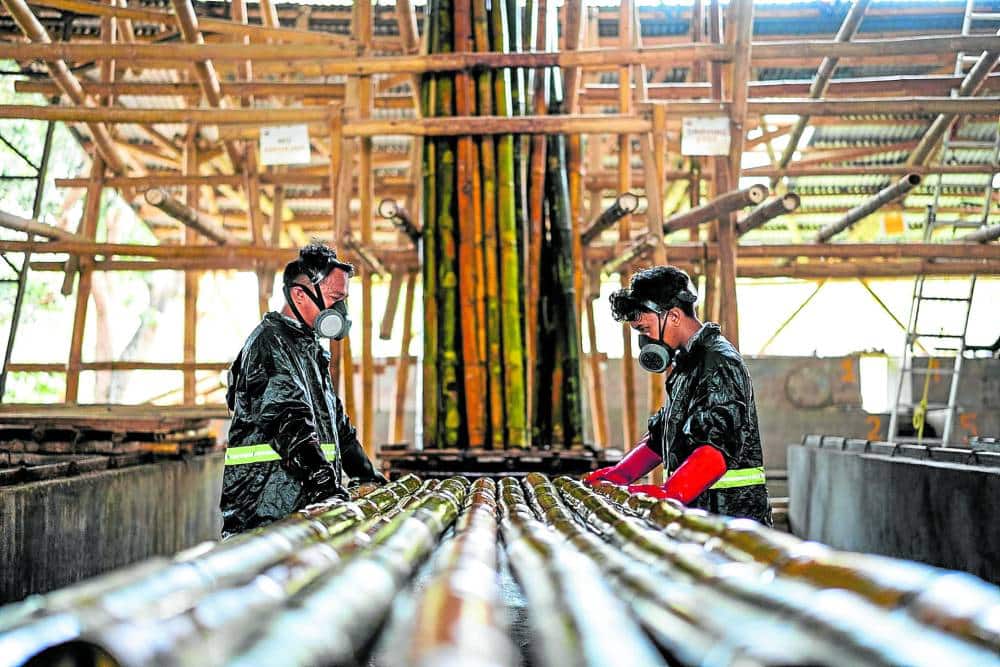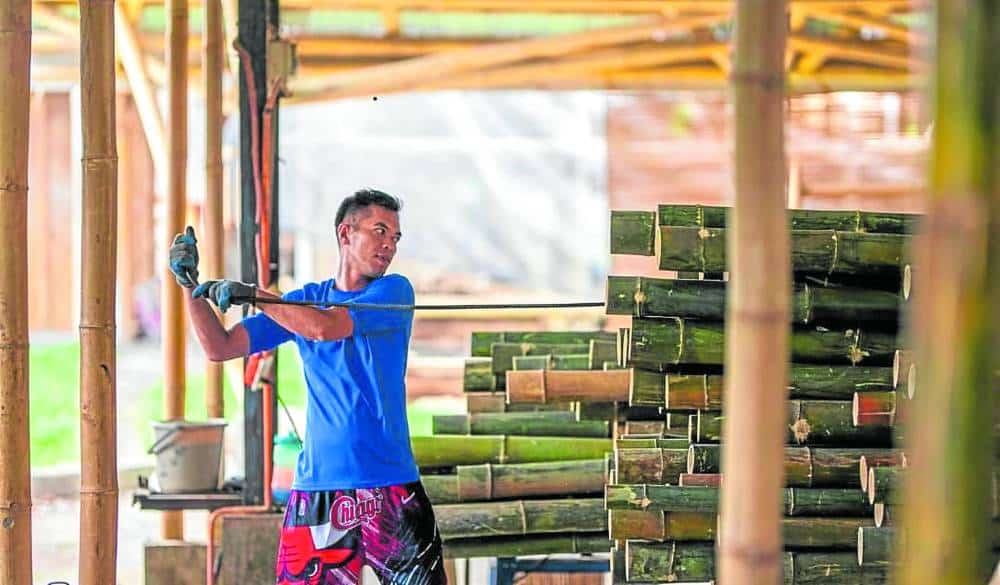
SUSTAINABLE Kawayan Collective produces at least 200 treated poles and 20 panels each week. It also supplies bamboo for the social housing projects of nongovernmental organizations like Base Bahay Foundation and Habitat for Humanity. —PHOTOS FROM KAWAYAN COLLECTIVE FACEBOOK PAGE
DUMAGUETE CITY—A social enterprise in the southern town of Dauin, Negros Oriental has been awarded a presidential recognition for promoting the use of bamboo as a construction material.
Kawayan Collective Agricultural Cooperative, headed by production manager Marbert Tinguha, was awarded by President Marcos, after besting several other micro, small and medium enterprises (MSME) in the small business category during the celebration of the MSME Development Week led by the Department of Trade and Industry (DTI) at Malacañang on July 10.
“The recognition of Negros Oriental’s Kawayan Collective by the DTI highlighted its significant contributions to sustainable construction and community development,” says Maribel Villaflores-Sumanoy, senior trade and industry development specialist, who spearheaded the search for the best MSME candidate in the province.
She says the recognition of Kawayan Collective underscores the potential of bamboo as a game-changer in the building industry through the efforts of the cooperative’s founder Ray Villanueva and his wife Amy.
Kawayan Collective is in the business of aggregating, processing and distributing treated bamboo poles, transforming them into resources that comply with construction-grade standards as an alternative to traditional building materials like cement blocks and steel.

The cooperative produces at least 200 treated poles and 20 panels each week. It also supplies treated bamboo for the social housing projects of nongovernmental organizations like Base Bahay Foundation and Habitat for Humanity.
Several housing projects are currently underway to provide shelter for families identified under the End Local Communist Armed Conflict (Elcac) program. These initiatives involve collaboration with the Department of Agrarian Reform and the Philippine Army.
In the southernmost town of Basay alone, over 100 houses are being built as part of the Negros Oriental Elcac Housing Project.
In Bayawan City, efforts include the construction of 10 duplexes and school buildings.
Where the artisans are
DTI helped establish in 2022 the Philippine Bamboo Industry Development Council to prepare a road map that aims to revolutionize the industry in the country, and find strategies to elevate its competitiveness and sustainability, Sumanoy says.
Kawayan Collective’s Villanueva says their decision to establish operations in the municipality of Dauin, about 16 kilometers south of Dumaguete, was influenced by various factors, notably the presence of skilled bamboo crafts artisans who have long upheld the tradition of bamboo craftsmanship in the area.
“Collaborating closely with these artisans in Dauin solidified our choice, acknowledging their expertise and invaluable contribution to the enterprise,” he says.
Records at the Department of Environment and Natural Resources show that Negros Oriental has around 900 hectares of bamboo thickets.
BADGE OF HONOR Kawayan Collective Agricultural Cooperative chair Marbert Tinguha (fifth from left) receives the Presidential Award for Outstanding MSME (small business category) from President Marcos. Also in the photo are (from left): MSME Development Council vice chair and Go Negosyo founder Joey Concepcion, Trade Secretary Alfredo Pascual and Executive Secretary Lucas Bersamin. —PHOTO FROM GO NEGOSYO
Villanueva recalls that the pandemic, which had happened during their second year of operation, prompted a “strategic shift” toward innovative solutions.
“With a renewed emphasis on waste utilization, we ventured into new product lines, including engineered panels, pre-fabrication models and bamboo starter house kits,” he says.
Collaborating with DTI and the Department of Science and Technology (DOST)–Forest Products Research and Development Institute, Kawayan Collective adheres to rigorous standards for grading procedure and test methods for bamboo structures, ensuring compliance with international quality benchmarks.
Villanueva notes how DOST-Negros Oriental helped provide a grant of P2.3 million for the construction of an eco-dryer.
“The project aimed to facilitate efficient and sustainable local production of engineered bamboo products, while enhancing the capacity and skill level of local suppliers to process, treat and distribute durable bamboo as a sustainable construction material,” Villanueva says.
He says using a kiln to process bamboo gives it a mold-resistant finish, useful in humid countries like the Philippines.
“Our investment in the bamboo industry encompasses the entire value chain of the community—from farmers to builders,” Villanueva says.

